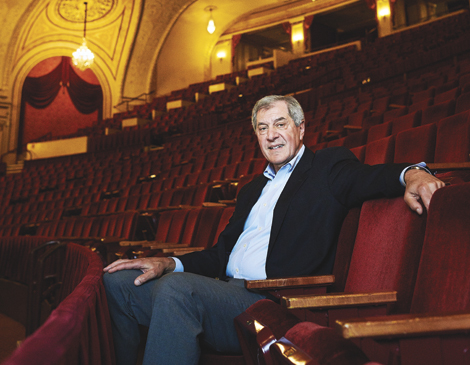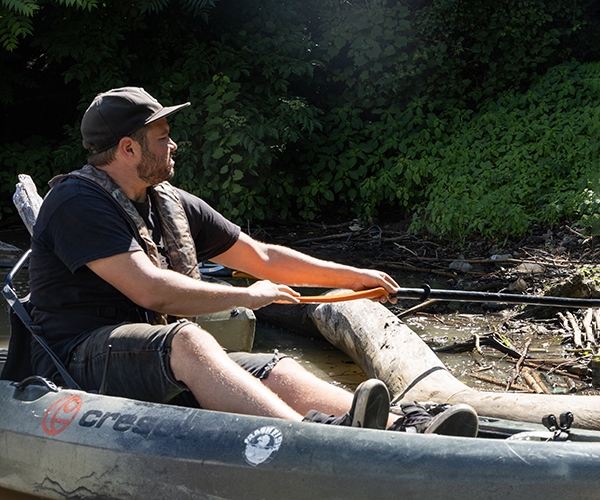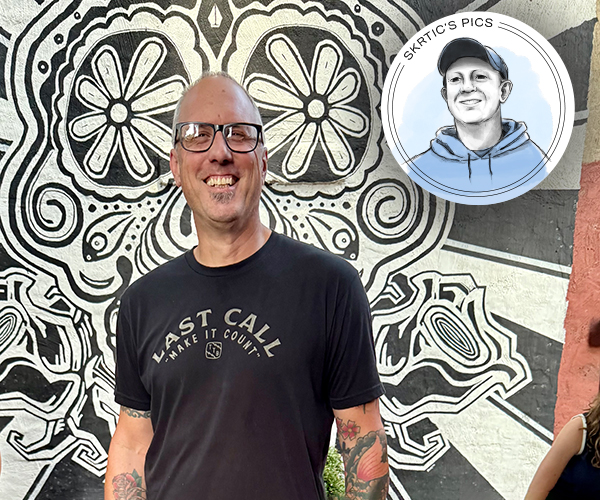
Playhouse Square President and CEO Art Falco Retires
The quiet maestro shares the lessons he's learned about theater, egos and helping to revitalize a city.
But reflecting on his tenure as one of the most influential economic development leaders in Cleveland’s history, arts or otherwise, the Painesville native is characteristically demure. Read up on the former president and current CEO of Playhouse Square to find bios dotted with words like “humble” and “cautious.” Falco, who joined the organization in 1985, prefers to implement a thoughtful, though not risk-averse, leadership style that’s flourished in the wings.
Since becoming president and CEO in 1991, the quiet maestro has steered Playhouse Square through a season of remarkably consistent success, helping transform the once balefully regarded downtown revitalization project into the country’s second-largest performing theater arts center, born from an innovative business model that leverages real estate development, education initiatives and strategic partnerships.
Ending every one of the last 30 fiscal years in the black, Playhouse Square stands as a glittering pillar of downtown’s bright new chapter.
Under Falco’s leadership, Playhouse Square’s annual attendance has grown to more than 1 million. The long-held dream to re-open four of the flagship Euclid Avenue theaters was finally realized in 1998 with the renovation of the Allen Theatre.
Today, the district has expanded from five performance spaces to 11, with six resident companies. Playhouse Square is one of the largest owners of downtown property, with the Crowne Plaza Cleveland, Idea Center and the under-construction skyscraper the Lumen among its assets.
Rock ’n’ roll may have lent Cleveland a reputation in the arts, but Playhouse Square used the arts to help rebuild it.
Now, an era is ending. On June 30, Falco officially retires, succeeded by president and chief operating officer Gina Vernaci. He’ll continue shepherding the Lumen’s construction, set to open in 2020.
As the curtain falls on a singularly decorated career, Falco shares a few lessons from his time in the spotlight.
I believe my only theater experience prior was playing a tree in a school play.
I originally thought I would stay [at Playhouse Square] 4 or 5 years, I’d make some wonderful contacts, and then bounce back to the “real world.” I soon realized this is the real world, because we’ve done some truly good things.
Most people think about the arts as “quality of life,” and that’s certainly true. You can’t have a thriving city without quality arts.
But the reality is, looking at the statistics, with the number of people working in the arts today, the economic impact surpasses all of our pro-sports teams. People never think of that, but it’s true.
In fall ’85, we co-presented a show called Black Patent Leather Shoes. We thought it would only run for three months, in a scaled-down version of the Palace with around 1,300 seats.
The show ended up running through May 1986. We drew an extra 100,000 people. For the year, we drew more than 500,000 people to Playhouse Square.
We told everyone that would listen that we outdrew the Cleveland Browns that year. That seemed to light up people’s eyes in terms of, Oh, we’ve reached credibility now.
You can’t recreate these beautiful theaters. One of the great attributes of Playhouse Square is seeing a theater and then finding a new, appropriate use for that space.
With the Allen Theatre, we had a renovated 2,500-seat theater, but then the old Cleveland Ballet and Cleveland Opera went out of business.
So, what are alternative uses?
You check your ego at the door and look at what’s best for both organizations and the community.
Cleveland State was performing in an old factory. The Cleveland Play House needed to upgrade their facilities. We formed this partnership between the three of us.
There are three legs to the stool. What you see on the stages, the area’s development and education. Clearly, exposing children to the arts creates potential future audiences. But exposing them to the arts also brings out their creative side.
Playhouse Square is a performing arts center and a neighborhood. This is one of our unique business models that we’ve developed. Most performing arts centers don’t have real estate. They try to influence real estate, but they don’t actually own it.
It was not our intent to be the developer of the Lumen. We were just convinced that it made sense to have an upscale apartment building on that site. We then found a vehicle to finance it.
It’s the most expensive project we’ve ever undertaken.
Having 1.1 million people coming to Playhouse Square annually, plus the people living and working here, it’s the most dynamic neighborhood in downtown Cleveland.
As we grow, people forget 1988 or 1989 or years before. They think the development has only been in the last 10 or 15 years. But like any project, you have to have a foundation.
It’s like baking a cake. People see it as you’re putting all the frosting on, but there was an awful lot of work to establish the foundation. They’re seeing the fruits of work that was done in all those years past.
people
8:00 AM EST
June 26, 2019



